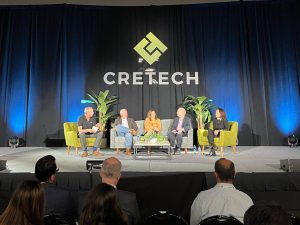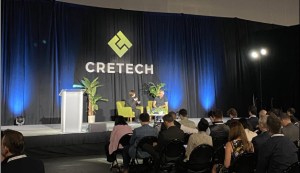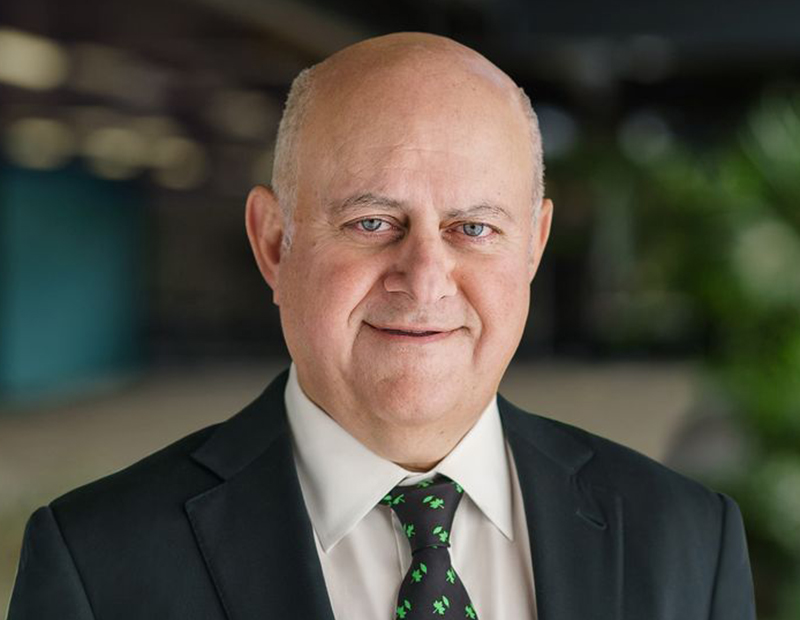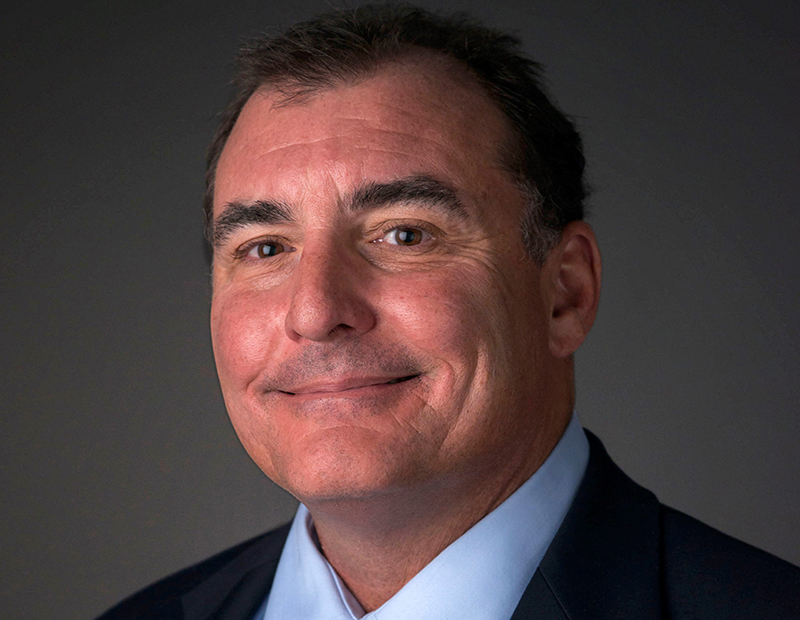CREtech 2023: The Digital and Physical Converge
While new technology may be appealing, companies must invest in what makes the most sense for their operations.

L to R: Brian Sutherland, Vice President of Sales at Yardi; Clinton Osteen, Senior Director of IT at Granite Properties; Ilene Goldfine, Chief Digital Strategy Officer at Hines; Sandy Jacolow, Senior Vice President & Chief Technology Officer at Empire State Realty Trust; Betsy Reed, Senior Vice President of Technology at Starwood Capital Group. Image by Gabriel Frank
Data analytics, generative AI, ESG initiatives and office tenant engagement were the buzz at the first day at CREtech New York 2023, one of the industry’s largest innovation expos. Panelists covered both emerging and longstanding technology trends within the $20.7 trillion market.
CEOs stay the course
In the first panel discussion, titled Recalibrating for the New Normal, Scott Rechler, chairman & CEO of RXR, provided his thoughts on the state of the economy, and some observations around his firm’s top business interests.
Top of mind were high interest rates coupled with a possible recession, public trust in financial institutions, as well as the present and future of the office work environment. “Unfortunately, I think that rates will stay higher for longer, and it likely means that (there will be) some recession.”
At the same time, Rechler noted several bright spots in the economy, such as in the stock market and in sectors including multifamily, with any possible knowledge on the severity and duration of a recession as buoying the expectations of investors. “There is chaos before the clarity, and the opportunity is in between the chaos and that clarity,” Rechler said.
When it came to discussing the realities of remote work and the evolution of the office sector, Rechler did not mince words. Owners and operators need to dial-in the quality and appeal of their spaces, in both the physical and digital realms. “We can’t pretend that it’s a good thing for work-life balance and productivity when people don’t want to come to work, worry about air quality and don’t want to come when it’s difficult. The days of lines and lines of cubicles are over.”

Scott Rechler, Chairman & CEO of RXR (right) in conversation with L.D. Salmanson, CEO & Co-Founder of Cherre. Image by Gabriel Frank
However, the incentives to do so stem not only from encouraging as much in-person collaboration as possible but to win over tenants in an increasingly competitive market. “70 to 80 percent of tenants out there want to get into 20 to 30 percent of the buildings.”
Such sentiments were shared in other panels later in the day, particularly one where several leading property companies shared their strategies for meaningfully implementing technology.
Ilene Goldfine, chief digital strategy officer at Hines, stressed that new adoptions of technology should prioritize the people that work both within and around commercial assets themselves. “We have put an entire ecosystem around people. “It’s (a matter of) hiring the right people that give the experience to our tenants, and standards for however we are going to be able to operate the business.”
Goldfine further detailed this approach to CPE in an interview, where she emphasized the importance of creating a “flexible” and “seamless” experience for tenants, one where they can work from space in a broad variety of assets that the firm manages, accessible through a newly developed tenant-experience platform. “How do you get that flexibility through technology?” Goldfine asked.
Data-driven investments

Yao Morin (left), CTO of JLL, in conversation with Raj Singh, Managing Partner of JLL Spark. Image courtesy of JLLT
In demonstrating these adaptations in real time, many panelists were eager to showcase their uses of two of the most commanding presences in CRE technology today: data analytics and generative AI. For the former, which has a presence in nearly every aspect of CRE operations, from maintenance management to social functions, the reliability of the information is more important than its volume. “We need to make sure that the data has good ownership, and you want a good governance policy that can identify it and how it is classified,” explained Yao Morin, JLL‘s newly appointed CTO.
For the latter, the firm has developed its own natural language learning and processing model, JLL GPT, the first of its kind in the industry. Morin spoke of the platform’s usefulness in areas such as project management and workflow optimization, and highlighted its ability to save on both time and costs in monotonous, difficult tasks such as accounting and bill-paying. “It can help extract data from (utility) bills, which is a simple thing, but it can be a game changer,” Morin said.
READ ALSO: Why Well-Being in CRE Projects Is a Must
Similarly, data analytics were shown to not only optimize a given company’s internal operations, but to be a key informer of investment priorities. On the venture capital side, sustainability and tenant experience-enhancement were the winners. Rezso Szabo, general partner at Illuminate Financial, believes that investments that focus on sustainability are a must. “Not having a net zero pledge as a large financial institution, and not wishing to serve that customer segment is no longer viable.”
In the same panel, Laurent Grill, a partner at JLL Spark Global Ventures, advised attendees to focus on startups that can “innovate in a variety of categories,” but to also focus on physical efficiency. For instance, Grill listed the example of efficiency in construction, which often comes by way of changing building materials, a decision made solely in the realm of the physical. “People have to make those changes. Tech is not the only solution,” Grill added.
Material priorities

Left to right: Bob Gillespie Managing Partner at REACH Commercial
Second Century Ventures; Abbey Donnell, Founder & CEO of Work & Mother; Kerri Davis,
Co-Founder & CEO
Fortress PropTech. Image by Gabriel Frank
Other panels at the conference focused less on data and more on experiential technologies and investments, and how they can drive value and heightened engagement at commercial properties. At one such panel, Abbey Donnell, founder & CEO of Work & Mother, a provider of lactation suites at office properties, discussed the importance of adding as much convenience and safety as possible to the workplace. “You are not competing with just the building down the street, you are competing with living rooms,” Donnell said.
The importance and stakes of this competition could not be higher, as fewer than half of new mothers that have returned to work since the pandemic have left in the first year. Consequently, investments in amenities and technologies such as Work & Mother have also allowed operators to create a more equitable office work environment.
Attesting to the value that solutions such as Work & Mother provide, Brian Wallick, director of New York Investments at Nuveen, noted that while these investments may appeal to a more niche variety of office workers, “the feelings they provide are more intense,” he told CPE. In turn, they not only exist as lucrative offerings for prospective tenants, but as incentives for existing ones. “It’s been a dramatic shift,” Wallick concluded.







You must be logged in to post a comment.